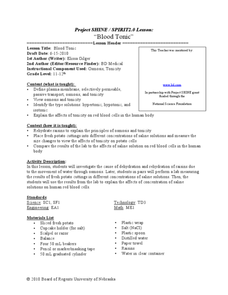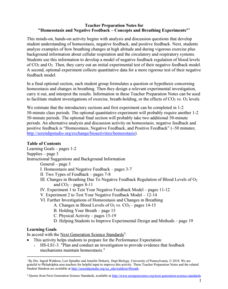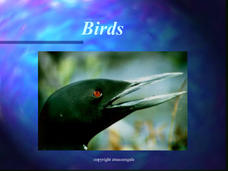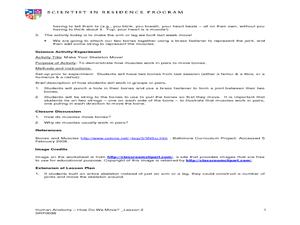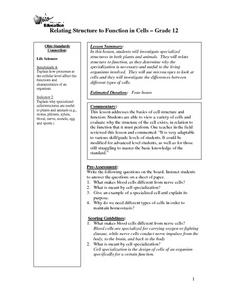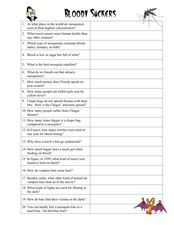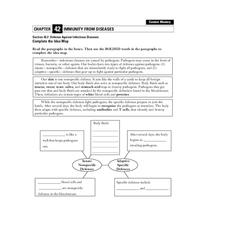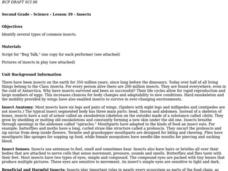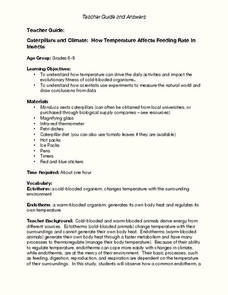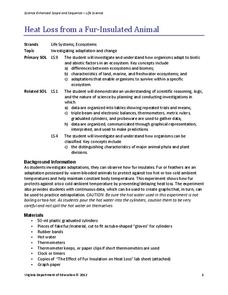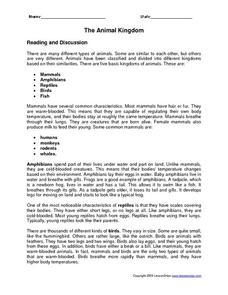Curated OER
Blood Tonic
Students investigate the process of osmosis using fresh potato cuttings in saline solution. In this biology lesson plan, students explain the difference between hypertonic, hypotonic, and isotonic solutions. They collect data...
Serendip
Homeostasis and Negative Feedback – Concepts and Breathing Experiments
More asthma attacks happen at higher altitudes, but why? Scholars complete worksheets, learning about homeostasis and feedback related to breathing. Then, they work in small groups to experiment with breathing in limited amounts of...
Beyond Benign
Punnett Square Possibilities
Discover possible genetic outcomes through Punnett Squares. Learners continue studying genetic traits in the 10th lesson plan in the 17-part series. After determining the father of Sparky's kittens, scholars now attempt to predict the...
Biology Junction
Birds
Birds adapted to almost every climate on the planet, from the Arctic to the rain forests. A presentation focused on birds covers their similarities and differences. It starts with their evolution from reptiles, their many physical...
Curated OER
Human Anatomy - How Do We Move?
Fifth graders discover how blood moves around the body. In this circulatory system lesson, 5th graders feel their pulse before and after exercise. Students count their heart rate. Students use the scientific method to record...
Curated OER
Relating Structure to Function in Cells
Twelfth graders investigate specialized structures in both plants and animals. They relate structure to function, as they determine why the specialization is necessary and useful to the living organisms involved. They use microscopes...
Curated OER
What's New With Dinosaurs?
Young scholars examine how scientists are at odds on whether or not dinosaurs were warm or cold blooded. In this dinosaurs lesson students divide into groups and research the evidence that supports each side.
Curated OER
Bloody Suckers
In this blood sucking animals learning exercise, students answer 20 questions about leeches, mosquitoes, Chepo bugs, and bats which all suck blood to transmit diseases or get nutrients.
Curated OER
Operation Anitbody
Students identify the types of cells that are important in the immune system. They investigate the different mechanisms used by white blood cells as they protect the body from foreign invaders. Students are given five case studies,...
Curated OER
Biology Trivia Questions
Students answer 71 questions about a variety of topics in biology. In this biology trivia lesson plan, students use the internet to find the answer to questions about the systems of the body, their structures and functions, the different...
Curated OER
Statistics
In this statistics worksheet, 9th graders solve and complete 10 various types of multiple choice problems. First, they determine the mean number of miles per day that were completed. Then, students determine the data set that has a...
Curated OER
Dealing With Diabetes
Students read a story about a teen with diabetes. They research diabetes and glucose. They compare and contrast Type 1 and Type 2 diabetes.
Curated OER
Tissues
In this tissue learning exercise, students are given notes on 6 types of epithelial tissues, 10 examples of connective tissue, three types of muscular tissue and the components of nerve tissue.
Curated OER
Food Pyramid and Dietary Guidelines
Students examine Food Guide Pyramid and Dietary Guidelines. They look at samples of serving sizes, sort different foods into their correct groups, complete worksheets to discover which types of foods they eat regularly, and discuss...
Curated OER
Defense Against Infectious Diseases
In this infectious diseases worksheet, students read about the two types of defenses the body has against pathogens: innate (nonspecific) and adaptive (specific). Students then complete a graphic organizer by filling in 11 blanks.
Curated OER
Chapter 5 Review
In this statistics worksheet, students solve and complete 10 different types of problems. First, they determine the probability of various actions described. Then, students describe an appropriate model for the number described and...
Curated OER
Insects
Second graders brainstorm and identify several types of common insects. They play bug bingo, building bugs and an insect tree, observing real insects in the classroom and examining some of the things insects make.
Curated OER
Caterpillars and Climate: How Temperature Affects Feeding Rate In Insects
Do you eat more when you are hot or when you are cold? Young scientists observe the eating pace of two caterpillars at different temperatures. The differences in endotherm and ecotherm animals' ability to adjust to temperature change...
American College of Sports Medicine
Selecting and Effectively Using Hydration for Fitness
How much water does your body lose during exercise? How much should you hydrate during and after exercise? Address the importance of hydration with your young athletes using this informative handout.
Virginia Department of Education
Heat Loss from a Fur-Insulated Animal
How do animals adapt to weather changes? Provide your class with the ability to understand adaptations and body temperature as they participate in this hands on experiment, using fake fur and hot water. Pupils collect data and...
BPE
Teacher Guide for Faster Passage: "Sympathy" and "Caged Bird" Poetry
Prepare class members for formative assessments of student thinking in reading (FAST-R) with a resource that compares Paul Laurence Dunbar's "Sympathy" and Maya Angelou's "Caged Bird." Readers respond to 10 multiple choice questions and...
ProCon
Vegetarianism
What do Mike Tyson, Ellen DeGeneres, and Paul McCartney have in common? They're all famous vegetarians. Using the resource, scholars learn about the pros and cons of eating a vegetarian diet. They read a fascinating history of...
Curated OER
The Animal Kingdom
For this animal kingdom worksheet, students read for information and determine comprehension. In this matching and fill in the blanks worksheet, students answer twelve questions.
Curated OER
Reptiles
In this reptiles activity, students identify and label the different parts of reptiles. They complete 10 short answer questions after reading the information provided in the activity.
